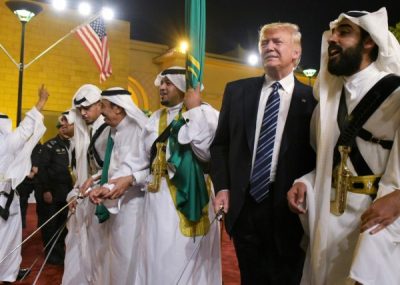Forget Trump’s Tough Talk, He’s Not Going to Let the House of Saud Fall

For as chaotic as “The Kraken” [Donald Trump] is, he’s not likely to let the House of Saud fall even after insultingly telling its King that he might be out of power within two weeks if it wasn’t for the protection afforded to him by the US military.
Trump’s fondly referred to as “The Kraken” by his many supporters who love his deliberately chaotic approach to destroying the previous world order (i.e. “The New World Order”), but while there remain plausible scenarios for the American-encouraged “Balkanization” of Saudi Arabia along the “Blood Borders” model, it’s not likely that the he’s going to go forward with the dismantlement of the Kingdom anytime soon like some people might think. The reason why this is even being talked about at all nowadays is because the President ominously warned the Saudi King “might not be there for two weeks without us”, which is why he should supposedly fork up more money for the protection afforded to him by the US military.
For as ruthless of a businessman as the billionaire is known for being after earning his fortune in the cutthroat sphere of New York City real estate, he probably won’t ever hang Saudi Arabia out to dry if Riyadh doesn’t more generously reimburse him for his military’s services because he can’t bear the thought of Iran attempting to take advantage of this. The US has been seriously concerned about the spread of the Islamic Revolution all throughout the Mideast ever since its 1979 success in Iran, and there’s no way at this moment in time that it’s going to take any chances that its hated foe could expand its influence in this strategic region by ideological proxy and therefore gain control of most of the world’s energy resources.
It’s true that the US participates in Riyadh’s royal conspiracies from time to time and probably does have an interest in working through these shadowy backchannels in order to slow down Crown Prince Mohammed Bin Salman’s developing strategic partnerships with multipolar leaders Russiaand China, but he’s not going to withdraw the US Military Training Mission(USMTM) to the country or the suspected CIA drone base there as he maneuvers to squeeze more money out of the Kingdom. Ensuring Saudi Arabia’s external security is one of the US’ chief national interests anywhere in the world for the aforementioned reason having to do with Iran, which is why Washington will always work to thwart Tehran’s plans in the Kingdom.
To be clear, there does indeed exist an unclear level of genuine domestic opposition to the monarchy that has nothing to do with Iran and everything to do with the country’s governing structure itself, but the US doesn’t play any direct role in suppressing this, not even thorough the USMTM. (US Military Training Mission to Saudi Arabia)
It can be argued that US training and equipment greatly aids the Saudi security services in their efforts to deal with these challenges to the royal family’s rule, but it’s still indirect support in this case unlike the direct military intervention that the US would undoubtedly carry out if Iran launched a conventional attack against its nemesis. What the US really wants from Saudi Arabia, then, is for it to commit to purchasing more American weapons.
The global media made much ado about Trump’s claim in May 2017 that he signed a $110 billion arms deal with Saudi Arabia, but the truth is that only around a quarter of those deals were even in the pipeline at the time. Trump clearly wants the Kingdom to go through with the spirit of this highly publicized photo shoot because of the boon that it’ll be for the US’ military-industrial complex and the strengthening of the two parties’ system of complex strategic interdependency that would result from this. In other words, it would be a double win for the US because the country would make billions off of this arrangement while also embedding itself even deeper into the Saudi military apparatus.
It shouldn’t be forgotten that the Kingdom is mulling the purchase of Russia’s S-400 state-of-the-art anti-air defense systems after having earlier signed deals for Kornet-EM anti-tank missiles, TOS-1A systems, automatic AGS-30 grenade launchers, and Kalashnikov AK-103 assault rifles during King Salman’s historic visit to Moscow exactly one year ago in October 2017, and that China is building a drone factory inside of Saudi Arabia too. The US sees the writing on the wall when it comes to the shipment of arms to Saudi Arabia from multipolar countries just like Russia sees the same when it comes to the export of arms to India from unipolar ones, and it’s therefore taking proactive steps to secure its hitherto dominance in one of the world’s largest weapons markets.
For as “politically correct” as it may be for people under the influence of Alt-Media Dogma to believe that the House of Saud would fall in two weeks’ time if the US discontinued all of its military support for the Kingdom, that probably won’t happen because “Israel” would pick up the slack to protect its unofficial ally from any speculative Iranian attack and the country’s internal security forces won’t suddenly lose the skills that they acquired from years of high-quality training which has thus far enabled them to successfully suppress all internal challenges to the royal family’s rule. Therefore, Trump’s ominous warning should be interpreted as a negotiating tactic to pressure Saudi Arabia into fulfilling the $110 billion arms deal that it signed with the US in May 2017 and not as anything more.
Andrew Korybko is an American Moscow-based political analyst specializing in the relationship between the US strategy in Afro-Eurasia, China’s One Belt One Road global vision of New Silk Road connectivity, and Hybrid Warfare.

